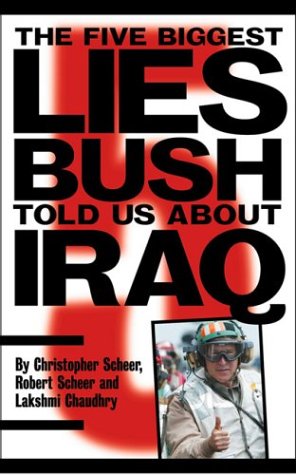The authors of this book could hardly have chosen a more accurate title. At 174 small pages (easily one of the shortest political tracts in recent memory), Lies keeps a tight focus on what it wants to show: that the Bush administration, commandeered by hawks with designs on the Middle East, knowingly brandished “total falsehoods” (five, in fact) to convince the nation of the need to wage war on Iraq. Their lies, namely, were suggesting that Saddam Hussein had links to al Qaeda; insisting that Saddam had imminently threatening chemical, biological and (this is separate) nuclear weapons; asserting the ease with which Iraq would be taken; and promising to make Iraq quickly into a beacon of peace and democracy in the region.
Undoubtedly, many if not all of these accusations will sound familiar verging on redundant to some readers, but what distinguishes Lies is the thoroughness and horrifying depth of their proof. Drawing on their impressive experience—father-son pair Christopher and Robert Scheer wrote extensively on Iraq in alternative media and the Los Angeles Times, respectively, and third gun Lakshmi Chaudry is the foreign policy expert at AlterNet—the authors marshal evidence from newspapers, official reports, public statements and a variety of secondary sources. The authors make particularly good use of quotations to show how the higher-ups hemmed and hawed to mislead the public toward war.
One notorious incident, the leak of spurious information about a pre-9-11 meeting in Prague between Mohammed Atta and Iraqi intelligence, caught Dick Cheney and Condoleezza Rice spinning half-truths in order to hide the fact that the Czech president had discredited their story more than a year earlier. They gave enough assent to convince conservative columnist Fred Barnes that “The meeting … bolsters the case for military action by the United States.” When the New York Times finally investigated these claims, it found that “they have no evidence that Mr. Atta was even in [the Czech Republic] in April 2001.” This same pattern of coordinated misinformation followed by exposure (never leading to retraction, let alone apology) is repeated in the Niger “Yellowcake” incident, David Kay's WMD report and numerous other similar episodes.
Like any hastily written book, however, Lies does have its share of questionable assertions. For example, the authors believe that the release of photos of Saddam's dead sons was merely a shrewd move “to ensure a media spectacle.” (Surely the media coverage was gratuitous and perverse, but the importance of convincing Iraqis that Uday and Qusay had been killed should not be underestimated.) And the occasional anti-Bush potshot makes it impossible to completely forget the authors' slanted viewpoint. Nevertheless, Lies is a remarkably fair and scrupulous book that is worth reading to see where all the tangled threads of controversy surrounding the war can be traced: the Bush administration's deliberate policy of deception.









